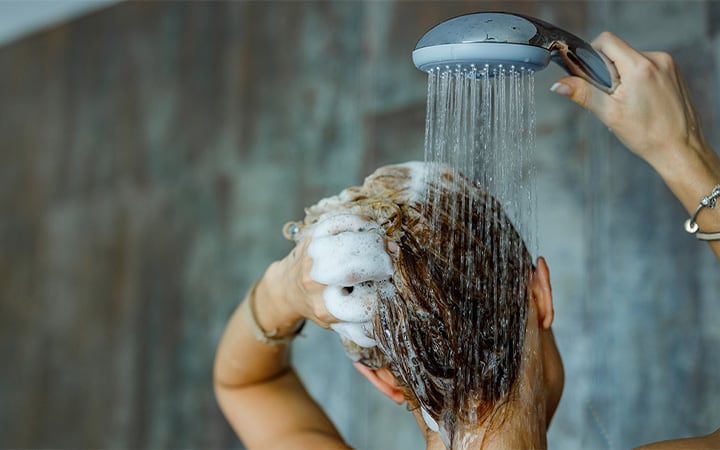How Often Do You Really Need to Shower? What the Experts Say
September 10, 2025

Showering is part of most people’s regular routine. But is it necessary to shower every day? “This can vary, depending on a person’s age, activities, climate, skin sensitivity or preference for personal freshness.” says Elizabeth Gordon Spratt, MD, a board-certified dermatologist at University Hospitals.
She explains why showering more isn’t always better and how to make sure you’re washing up in ways that support skin health.
Why Good Hygiene Matters
“Bathing is an important ritual for our bodies for several reasons,” says Dr. Gordon Spratt. “Throughout our daily life, sweat, bacteria, dead skin cells and pollutants from the environment accumulate on our skin, and washing helps remove them.”
Good hygiene helps to:
- Reduce body odor created by bacteria and sweat on the skin.
- Prevent skin infections, including bacterial, fungal or yeast infections.
- Support mental health by reducing anxiety and stress, preparing the body for restful sleep and improving overall mood.
Showering More Isn’t Always Better
It may seem like the cleaner you are, the better, but showering too frequently can be tough on your skin. “Our skin’s natural moisture helps protect it against environmental stressors,” says Dr. Gordon Spratt. “If a person bathes too often, or they use hot water or soaps with strong detergents, it can disrupt the skin’s protective natural moisturizing barrier.”
When the moisture gets stripped away, skin can become red, tight, itchy or dry. If it gets too dry, it can split open, and bacteria, viruses, fungi, allergens and irritants can get in and wreak havoc on the deeper layer of the skin.
Over-showering can be harmful in other ways too. Dr. Gordon Spratt says showering too frequently can:
- Trigger flares of sensitive skin conditions like eczema and psoriasis.
- Alter the skin’s microbiome—the population of healthy bacteria, yeast and “good” microbes that are needed to prevent infections and control inflammation.
- Cause scalp dryness, itching or flaking, and in some cases, it can increase oiliness of the scalp and hair.
- Dry out hair shafts, making your hair more brittle and prone to breakage, frizz and split ends.
- Negatively impact the environment through unnecessary overuse of water.
Problems for People With Skin Conditions
If you have eczema, psoriasis or another skin condition, you may be more sensitive to hot water and harsh detergents, says Dr. Gordon Spratt. It’s better to shower with lukewarm water (never hot) and use gentle, fragrance-free skin cleansers. Applying an emollient moisturizer immediately after drying off can help too. She also recommends avoiding exfoliating with a loofah, dry brush or coarse washcloth, since it can increase inflammation and worsen the condition.
Acne symptoms vary from person to person, but your dermatologist can recommend a cleansing routine based on your skin type, type of acne and any prescription medications you’re taking, says Dr. Gordon Spratt.
Tips for Healthier Showers
For most adults, Dr. Gordon Spratt recommends showering just once a day at most. For elderly adults, she says one shower every 2 to 3 days is sufficient, since skin tends to be drier and frequent bathing can exacerbate it. For healthier skin, follow Dr. Gordon Spratt’s tips:
- Don’t overdo it. “The maximum recommended number of showers for most people is two showers per day,” says Dr. Gordon Spratt. She also recommends keeping showers on the shorter side and using lukewarm water instead of hot water.
- Avoid harsh cleansers. Stay away from anti-bacterial, high-alkaline and deodorant soaps, as well as soaps that contain sulfates or fragrances, says Dr. Gordon Spratt.
- Wash with gentle cleansers. Look for cleansers labeled “fragrance free” or “for sensitive skin,” and check the ingredients label to see if they contain ceramides, which can help lock in moisture. “Synthetic detergent bars (syndet bars) are also good options,” she says. “They’re pH-balanced, so they’re gentler on the skin than traditional soaps.”
- Focus on the dirty parts of the body. Use soap to wash your armpits and groin area (and any other part of you that may be dirty or sweaty), but use only water to rinse off the rest of you.
- Moisturize. Apply emollients immediately after drying off to help support your skin’s protective natural moisturizing barrier.
- Don’t forget about your hair. Choose sulfate-free shampoos or look for pH-balanced shampoos and moisturizing/hydrating shampoos. Steer clear of clarifying shampoos, volumizing shampoos, sulfate-containing shampoos and strong medicated shampoos (unless recommended by your doctor). “These can be drying and potentially irritating,” she says.
Signs You’re Showering Too Much or Too Little
If you’re experiencing dry or itchy skin, redness, irritation or excessive oiliness, it may mean that you’re showering too often.
Signs that you’re not showering enough, may include:
- Body odor
- Itching
- Irritation
- Visible dirt
- Sweat build-up on the skin
- Feeling unclean or like your skin is sticky
- Oily hair with an itchy scalp
“Monitor your skin and overall well-being, and make adjustments as needed,” says Dr. Gordon Spratt. “The needs of our skin will change over time as we experience changes in age, lifestyle, health conditions, skin conditions, activities and more.
Related Links
Dermatologists at University Hospitals provide the latest diagnostics techniques, as well as compassionate, individualized care for a wide range of services and conditions, including skin cancer, acne, eczema, dermatitis and psoriasis.


